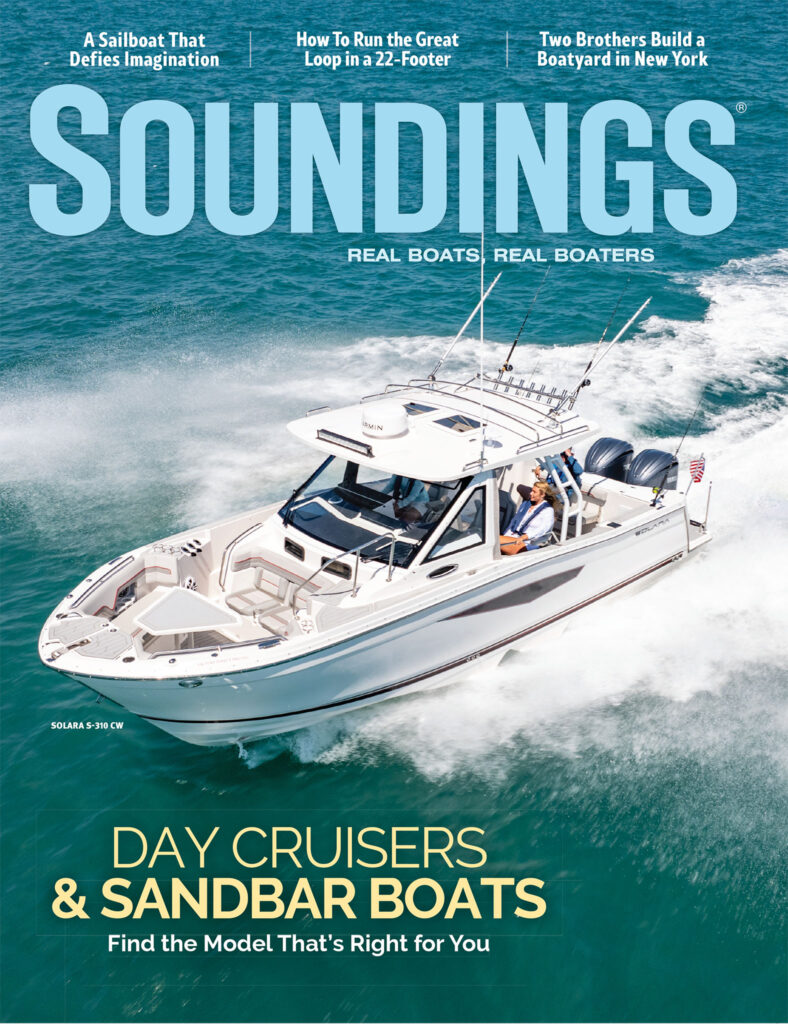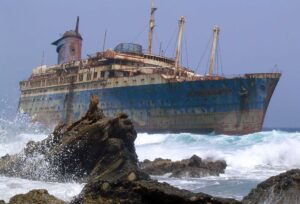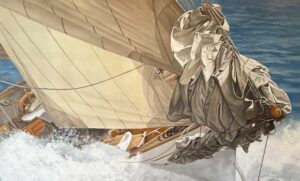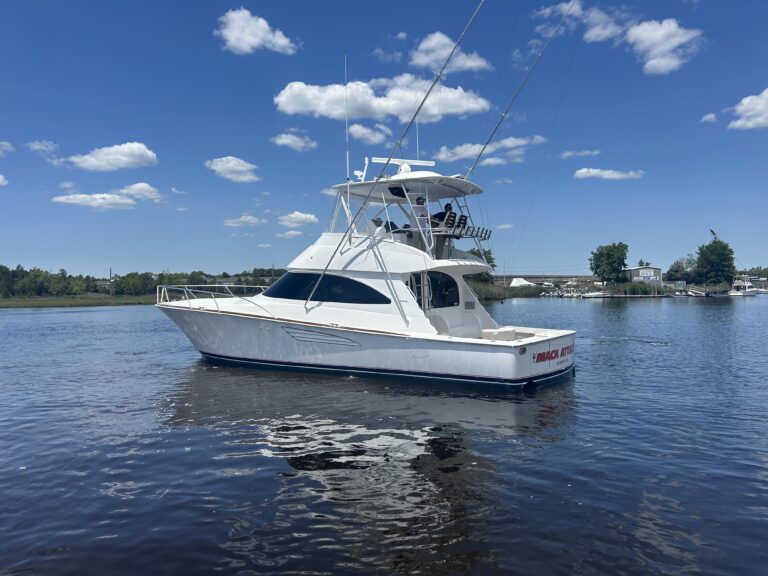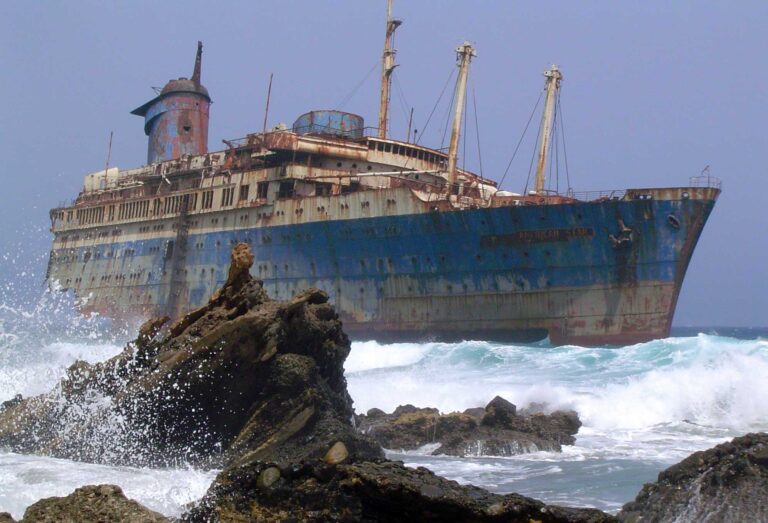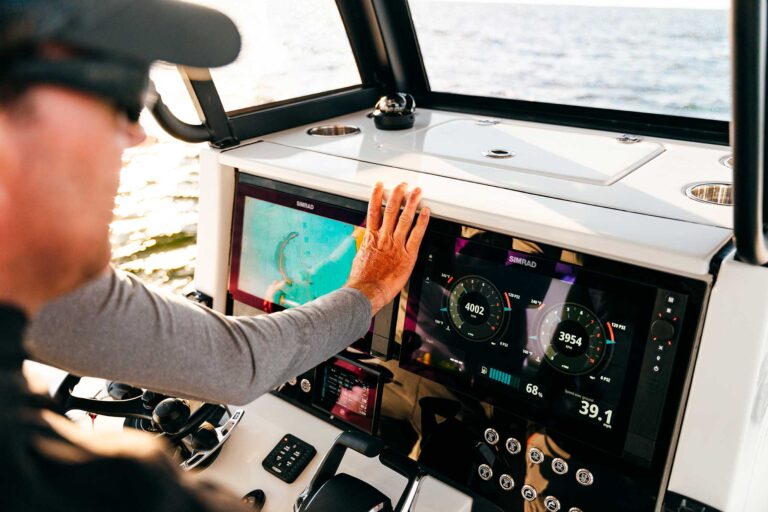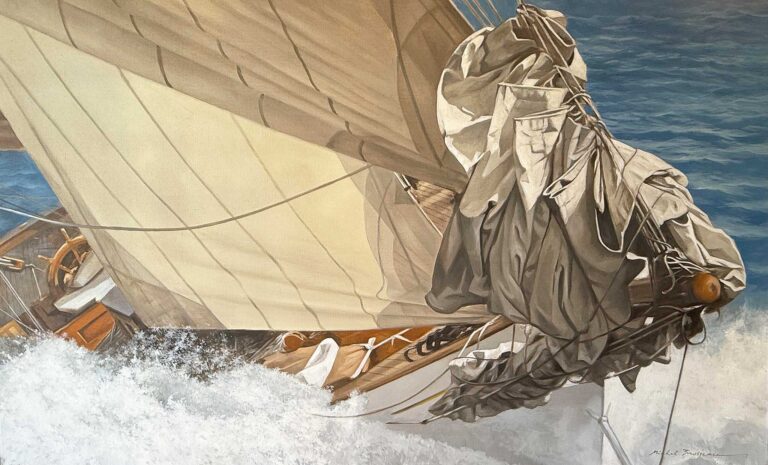
Just before 6:00 a.m. Danielle Randolph, the second mate, appears at the bridge companionway.
“Hi, how are you, Captain?” she says brightly.

“How are you?” Davidson replies. He sounds happy to see her, but his question, like hers, is ritual. Both officers know how they are, and it’s not so hot. Davidson, as always, puts a bright face on the situation:
“A scuttle popped open and there’s a little bit of water in three-hold. They’re pumping it out now.”
The bridge telephone rings. The chief engineer now asks the captain to reverse his earlier move and turn the ship back to starboard, bringing the wind on the port side again to resume the starboard list. Apparently the list to port causes worse problems than a tilt the other way.
What is pretty certain is that, either by studying general diagrams or through a basic understanding of how intake pipes are always set higher to avoid sucking in dregs collected in the lowest parts of a sump, Pusatere and his crew have a good idea of what must be going on. They understand that, with a strong list, any vertical gap between intake and sump bottom will shallow the pool of available oil; and that a pipe off set to one side means that a list the other way will slosh the oil even farther away from the intake, compounding the problem. Since the intake pipe is set to starboard, they need to turn the ship back in that direction, put waves and wind to port again, to regain a starboard list.

“Bring it back, roll back over to starboard,” Davidson tells the helmsman. “Keep her right twenty.”
“Rudder right twenty,” says Hamm, the able seaman at the wheel.
Chief mate Shultz comes back from 2nd Deck, confirms the scuttle is secured. He volunteers to return to the cargo holds. Davidson agrees. “We need eyes and ears down there.”
One of the radars has crapped out. Randolph bends over the set, adjusting, rebooting. Soon the screen glows with the image of the islands the ship has left behind. She plots the ship’s position off San Salvador.
The wind, changing angles as El Faro turns slowly to starboard, rips something else loose.
“There goes the lawn furniture,” Randolph says.
“Let’s hope that’s all.” It’s the first time Davidson’s words have betrayed any glumness.
Randolph quickly offers, “If you don’t need me, you want me to stay with you?”
“Please,” Davidson replies.
“It’s just,” he continues, “it’s just the …” But he’s interrupted by the walkie-talkie’s call-up tone. Shultz has gone down to the engine room and is checking in from there, and Davidson asks him to tell the engineers to reverse the ballast procedure, fill the starboard ramp tank now to help with the general aim of bringing the ship’s tilt back to starboard.
The chief mate confirms, “Port to starboard ramp tank.”
“I’m not liking this list,” Davidson tells the bridge at large.
And at that moment the world changes.

The ongoing pulse of engines deep below, the sempiternal tremble of deck and joinery that is the sign, tactile as much as auditory, that El Faro’s heart is beating, her engines driving her and all her people in the direction they’re supposed to go in, begins to falter.
Slows in rhythm.
Fades, at last, to nothing.
In the alien, deadly silence that follows, the shriek of Joaquin against the windows, against the hull, grows to deafening volume by contrast.
“I think we just lost the plant,” Davidson says.
Of course Joaquin is not sentient. Of course this storm has not chosen El Faro and her people out of some animistic perversion, some sick need to destroy and kill a worthy vessel and a crew of thirty-three decent, hardworking humans; professionals, family people connected to a wide web of wives, children, parents, friends; all as innocent as people can be who go to sea knowing the dangers they face, the hubris all mariners in some way commit by betting they can always, successfully, pit wits and talent against something so vast.
Melville writes in Moby-Dick, a book that’s all about man’s hubris on great waters, “For ever and for ever, to the crack of doom, the sea will insult and murder [man], and pulverize the stateliest, stiffest frigate he can make; nevertheless … man has lost that sense of the full awfulness of the sea which aboriginally belongs to it.”
Yet to anyone tracking Joaquin and El Faro together over the last two days, a sense of awfulness must come; for the storm’s aura of ill intent seems only to deepen. By six in the morning of Oct. 1 the hurricane — still drunk on overheated ocean, still trashing wind shear, still following the upper-level airflow — has been zeroing in on El Faro’s track for forty-eight hours straight. When the ship’s engine shuts down, Joaquin’s center is a mere twenty-five miles to the southeast; the opposite direction from that which Davidson expects, as if the storm were deliberately trying to lunge under his guard. El Faro, disabled and helpless, lies almost within the eye, inside its circle of strongest winds.

Joaquin is now approaching Category 4 status, winds averaging 115 knots, gusting to 130 — close to 150 mph. Most humans in such winds would be blown off anything they clung to, and what they clung to would be ripped off sea or ship or earth and hurled after them. The waves routinely reach heights of twenty, sometimes thirty feet; occasionally, a wave will reach close to fifty feet, the height of a five-story building, a dark mass of water streaked like a rib-eye steak, only instead of fat veining the liquid flanks, these are white tendons of watery fury stretched by the massive energy of wind; and the wave tops are impossible to see, for that same wind is shearing off the waves’ summits and using them to rocket some matter that is neither sea nor air but an abrasive mix of spume and salt water, a slurried ganache of surf that will rip clothes from the body and drown the very breath in your throat. On El Faro, even as what momentum she has left keeps her heading, temporarily, close to the wind, spume abrades every unsheltered surface, and waves must now consistently blast over Main Deck, crashing against the container stacks, the breezeway, and bottom of the house.
Second Deck has become part of the sea, a surging tumult of black water and phosphorescent eddies.

And Joaquin is not done.
On the bridge nothing much has changed except that the storm now lashes the starboard windows harder and the deck is tilting even more the other way, to port, as El Faro drifts on, her great length now lined up with the vast and deepening troughs of Joaquin’s rollers. Hamm, at the wheel, is trying to tweak the ship’s heading. More spray must be getting into the wheelhouse: white noise from frying electronics fills the area. Davidson tells the chief mate to shut down some of the electricity panels so water won’t short them out.

Shultz mentions possible difficulties with pumping more than one hold — if the ballast pump sucks air, he suggests, it, too, could wind up shutting down.
Suddenly Davidson’s reserves of optimism are sucking as dry as the lube-oil pump. “Don’t think it’s gettin’ any better,” he says, of the list most likely; maybe of everything else that has gone so badly wrong.
Randolph has been doing the second mate’s job: navigating, staring at the working radar screen, the GPS repeater. “We’re drifting southwest,” she tells the captain now.
Mathias, the riding crew supervisor, calls from the engine room with a general question about how things are going (“It’s lookin’ pretty nasty,” Davidson says); and a more specific query about the down-flooding angle, the angle of heel at which ventilation intakes on 2nd Deck, normally well above any conceivable wave action, will be underwater, at which point the engine room will start to flood. It’s not just a technical question: if the engine room starts to flood, the ship will sink. It’s more like Mathias is asking how long El Faro has to live.
“Um, that I don’t have an answer for ya,” the captain says.
Mathias suggests digging out information in the chief engineer’s office, which nobody has time to do right now; and even if they tried they would be unsuccessful, since Tote’s sparse stability guidelines include no inf ormation about downflooding angles, or even where flooding might occur.

Clearly the list is going from bad to worse, and the rate at which it’s getting worse is speeding up. Although Davidson tells Mathias, “We still got reserve buoyancy and stability,” the next thing he says is “All right, we’re gonna ring the general alarm here and get everybody up. … We’re definitely not in good shape here.
“Just make a round on two-deck and see what you can see,” he tells Shultz. “This isn’t gettin’ any better.” Then, ever solicitous of his crew: “You all right?”
“Yeah,” Shultz says. “I’m not sure I wanna go on second deck. I’ll open a door down there and look out … chest-deep water.”
The chief mate fights his way down the stairs, which must now be tilting like a fun-house corridor. Davidson calls him up almost immediately on the walkie-talkie.
“Hey, chief mate. This is just a heads-up. I’m gonna ring the general alarm. Get ya muster while you’re down there. Muster all, mate.” Then Davidson rings the engine room with the same message: “We’re not gonna abandon ship or anything just yet, all right? We’re gonna stay with it.
“Yeah, all is fine,” Davidson continues, with a flash of his old optimism, “… but let everybody know I’m gonna ring the general alarm.” Then he turns to the second mate and shouts, “Ring it!”
A high-frequency ringing erupts throughout the bridge — throughout the ship. A familiar sound at noon, when it’s always tested; the sound of danger, fear, a damn serious situation at any other time, and especially when the ship is tilting in this way, so obviously sick, jerking like someone hurt, while what can be seen and heard through portholes and windows speaks of something insane outside, crazy dangerous, wind and sea gone into a whole other state, sick with senseless fury. Adrenaline surges, pulse spikes. The stomach, if not already upset by the ship’s rolling, cramps with tension. Anyone still asleep will be jackknifing out of his or her bunk at this point, halfway ejected to port if his bunk is to starboard, ears numb from the alarm, stumbling against the list and foul movement, groping for the light switch, throwing on pants and T-shirt, fumbling out the life jacket, survival suit. In the corridors people are yelling. The first reflex of most mariners, after grabbing life vest and Gumby, is to pound on their buddies’ doors, make sure they’re up. The second is to get to the muster station: embarkation deck, which is the engineers’ level, two flights up from the mess, one from the crew’s quarters. Moving as fast as possible on a deck that feels like it’s lusting to become vertical bulkhead, a wall; hanging on to railings with one hand, Gumby with the other, trying not to be knocked on your ass when the ship rolls hard — it takes time to put on a survival suit, you have to lay it flat on the deck and drag it on one leg at a time, like pulling on farmer johns made of thick rubber, no easy task; might as well get to muster station first and await orders?

Shultz is on the embarkation deck yelling at everybody to muster on the starboard side. Muster station for half the crew is normally to port, but that side is close to the water and the deck there is regularly being cleared by waves.
Davidson’s voice crackles from the chief mate’s walkie-talkie. “Yeah, what I’d like to make sure, everybody has their immersion suits and, uh — get a good head count.”
On the bridge a mid-frequency beeping sounds insistently; it will never quit. Randolph is looking out a window; from somewhere there’s enough light to see the deck through the storm waves now washing the containers or looming mountainous against the canted windows. “All right, I got containers in the water!” she yells.
“All right,” Davidson yells back. “All right, let’s go ahead and ring it — ring the ‘abandon ship.’ ”
For the first time in her life the second mate does what no mariner ever wants to do: she smacks the brightly colored button that signifies the ship is lost. A shrill bell, different from the general alarm, starts to clang, seven times in a row, then another seven — and keeps on clanging.

“Tell ’em we’re goin’ in!” Davidson calls.
“Can I get my vest?” Randolph asks the captain.
“Yup,” Davidson says. “Bring mine up, too, and one for Frank.”
“I need two,” Hamm says — is the big AB actually joking in this?
“Bow is down,” the captain remarks; and El Faro begins to die.
Copyright © 2018 by George Michelsen Foy. From the forthcoming book RUN THE STORM: A Savage Hurricane, a Brave Crew, and the Wreck of the SS El Faro by George Michelsen Foy to be published by Scribner, a Division of Simon & Schuster, Inc. Printed by permission.
This article originally appeared in the June 2018 issue.

